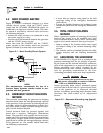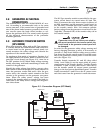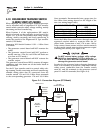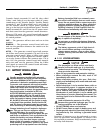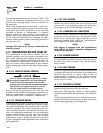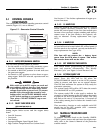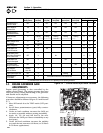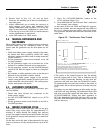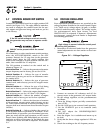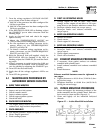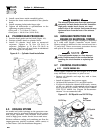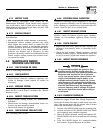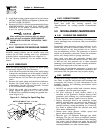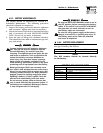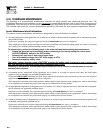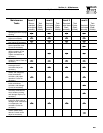
18
3.7 CONTROL BOARD DIP SWITCH
SETTINGS
Located on the control board is an eight position DIP
switch (see Figure 3.2). The eight different switches,
are used to configure the control board for the spe-
cific engine and governor being used and are pre-set
at the factory.
If the DIP switch settings are not set correctly,
the generator may not start or operate correct-
ly.
240 VAC can be present within the control
panel.
If it is necessary to select an alternate switch position,
move the AUTO/OFF/MANUAL switch to the OFF
position. Remove the 15 amp fuse in the generator
control panel. Move the DIP switch position that
needs to be changed to its new position. Wait five sec-
onds, then re-install the 15 amp fuse.
The ON position is marked on the switch and is
shown in Figure 3.2.
Switch Position 1 — Selects the generator alternator
output frequency and is factory pre-set for 60 Hz.
Switch Position 2 — Selects the type of transfer
switch and is factory pre-set for an automatic trans-
fer switch (ATS).
Switch Position 3 — Selects the type of governor
control used, and is factory pre-set for stepper motor
operation.
Switch Position 4 — Selects the type of fuel being
used and is factory pre-set for natural gas (NG).
Switch Position 5 — Selects the engine displacement
and is factory pre-set for a 2.5 liter (2.5L) engine.
Switch Position 6 — Selects the number of engine
cylinders and is factory pre-set for four cylinders.
Switch Position 7 — Selects the direction of rotation
of the governor stepper motor and is factory pre-set
for CCW rotation (rotation is observed looking at the
stepper shaft as it moves from closed throttle to open
throttle).
Switch Position 8 — Selects whether the control is
in the Normal Mode of operation or Test Mode. In the
Normal Mode of operation, pre-determined governor
gains are used and the gain trimpots on the control
board (Gain, Stability, and Differential) are not active
and have no effect on the gains. In Test Mode the gain
trimpots are active and can be adjusted. See Section
3.3.
3.8 VOLTAGE REGULATOR
ADJUSTMENT
Four adjustment potentiometers are provided on the
voltage regulator installed in the control panel (Figure
3.4). These are (a) voltage adjust, (b) gain, (c) stabili-
ty and (d) underfrequency adjust. The voltage regula-
tor potentiometers have been factory set and
SHOULD NOT be adjusted. If however, adjustments
are necessary, contact the local Dealer to implement
the following procedure.
High voltage is present inside the control panel
during this procedure.
1. Disconnect all electrical loads from the generator
(initial adjustments are done under no-load con-
ditions).
Figure 3.4 — Voltage Regulator
2. Connect an accurate AC voltmeter and AC fre-
quency meter to the generator’s AC output leads.
3. On the voltage regulator, set the potentiometers
as follows:
A. Turn the Voltage Adjust pot fully counterclock-
wise (CCW).
B. Set the GAIN pot to its centered (mid) position.
C. Set the STABILITY pot to its centered (mid)
position.
D. DO NOT adjust the UNDERFREQUENCY
ADJUST pot.
4. Start the engine. Let it stabilize and warm up at
no-load.
5. Verify that the three voltage regulator’s LED’s are
ON.
6. Check the reading on the AC frequency meter.
!
Section 3 - Operation
Liquid-cooled 15, 20 and 25 kW Generators



